Potřebujeme váš souhlas k využití jednotlivých dat, aby se vám mimo jiné mohly ukazovat informace týkající se vašich zájmů. Souhlas udělíte kliknutím na tlačítko „OK“.
ASTM D6208-07(2014)
Standard Test Method for Repassivation Potential of Aluminum and Its Alloys by Galvanostatic Measurement
Automaticky přeložený název:
Standardní zkušební metoda pro repasivační potenciálu hliníku a jeho slitin měřením Galvanostatic
NORMA vydána dne 1.2.2014
Informace o normě:
Označení normy: ASTM D6208-07(2014)
Poznámka: NEPLATNÁ
Datum vydání normy: 1.2.2014
Kód zboží: NS-34231
Počet stran: 6
Přibližná hmotnost: 18 g (0.04 liber)
Země: Americká technická norma
Kategorie: Technické normy ASTM
Kategorie - podobné normy:
Anotace textu normy ASTM D6208-07(2014) :
Keywords:
aluminum, corrosion, electrochemical measurement, galvanostatic, localized corrosion, polarization, ICS Number Code 77.150.10 (Aluminium products)
Doplňující informace
| Significance and Use | ||||||||||||
|
5.1 This test method is designed to measure the relative effectiveness of inhibitors to mitigate pitting corrosion of aluminum and its alloys, in particular AA3003-H14, rapidly and reproducibly. The measurements are not intended to correlate quantitatively with other test method values or with susceptibility to localized corrosion of aluminum observed in service. Qualitative correlation of the measurements and susceptibility in service has been established (1). 5.2 The maximum potential reached upon initial polarization, EB, is a measure of the resistance to breakdown of the aluminum oxide film. Lower susceptibility to initiation of pitting corrosion is indicated by a more noble potential (See Practice G3 and Terminology G15.) This potential, as measured in this test method, is not very sensitive to the inhibitors present. 5.3 The minimum potential, E5.4 Visual examination of the specimens can provide information about subleties of the pitting and inhibition mechanisms. Number of pits, pit depth, amount of deposit, and surface discoloration are some examples of recordable observations, which can assist evaluation of inhibitor effectiveness. 5.5 The presence of chloride in the test solution is critical to observation of pitting corrosion. Also, a coolant/corrosive water solution in which gas bubbles evolve spontaneously on the aluminum (indicating general corrosion) is unlikely to have a significant amount of observable pitting corrosion. |
||||||||||||
| 1. Scope | ||||||||||||
|
1.1 A procedure to determine the repassivation potential of aluminum alloy 3003-H14 (UNS A93003) 1.2 The test method serves as a guide for similar measurement on other aluminum alloys and metals 1.3 The values stated in SI units are to be regarded as the standard. Values given in parentheses are for information only. 1.4 This standard does not purport to address all of the safety concerns, if any, associated with its use. It is the responsibility of the user of this standard to establish appropriate safety and health practices and determine the applicability of regulatory limitations prior to use. |
||||||||||||
| 2. Referenced Documents | ||||||||||||
|
Podobné normy:
Historická
1.5.2012
Historická
1.5.2010
Historická
1.11.2009
Historická
1.4.2013
Historická
15.6.2010
Historická
1.5.2006


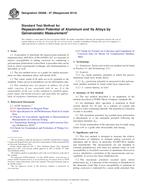
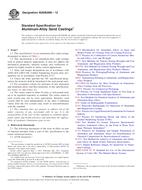 ASTM B26/B26M-12..
ASTM B26/B26M-12..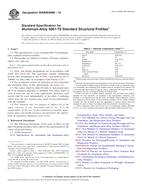 ASTM B308/B308M-10..
ASTM B308/B308M-10..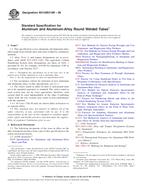 ASTM B313/B313M-09..
ASTM B313/B313M-09..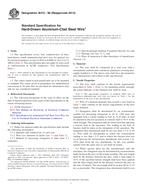 ASTM B415-98(2013)..
ASTM B415-98(2013)..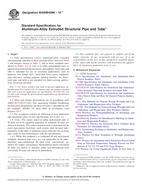 ASTM B429/B429M-10e1..
ASTM B429/B429M-10e1..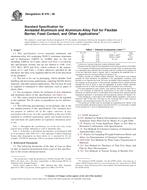 ASTM B479-06
ASTM B479-06
 Cookies
Cookies
